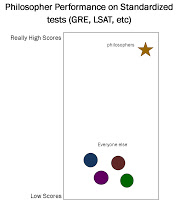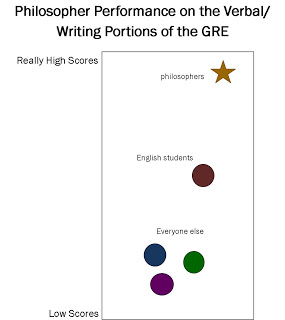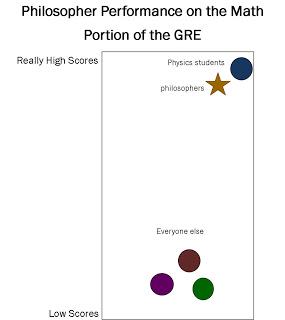Philosophy




- What Do Philosophers Consume?
This chart is a 100%, scientific, and accurate* representation of what philosophers consume when left unattended. (Click on the image to enlarge it). I hope this helps. You may want to intervene and present your philosopher with nutrient-rich meals every...
- Comprehensive Exams
[Note: I did not have my philosopher look this over today because I was in a hurry, so there might be serious errors or lapses in judgment. Please excuse me in advance]. Perhaps you?ve heard rumors of a terrible test or a series of terrible tests that...
- Will The "cultural Barriers" Be Overcome In Philosophy Departments Too?
Second-year Emily Hatch discusses how modern philosophers should interpret female stereotypes in classic philosophy texts in a Women in Philosophy meeting Thursday evening. "Female philosophers find a room of their own" Two female philosophy undergraduates...
- Ban Double Majors...is This Really An Issue?
"Should Colleges Ban Double Majors?" by Kayla Webley January 31st, 2013 Time Tucked in a list of suggested reforms issued last week for how U.S. colleges could increase graduation rates is a recommendation that schools “narrow student choice” in...
- Universities And Umbrella Majors
"Nationally, the most popular major chosen by college students is business, according to statistics compiled in 2006 by the U.S. Department of Education." Is this really the material for higher education and better suited for specialized institutions....
Philosophy
Undergraduate Philosophy Students: Choosing Philosophy
I thought it might be fun to do a short series of posts on undergraduate philosophy majors. Today, we?ll talk about why students generally pick up a philosophy concentration. My next post will discuss the evolution of the common undergraduate philosophy major. There might be a third post about common career paths for the recent philosophy B.A. [Only if I can make it clever enough. Right now the idea of discussing career paths seems much too dull].
Undergraduates become philosophy majors for a very different set of reasons than graduate students. I was an English major myself, so I know from experience that English majors generally become English majors because they either (1) love literature or (2) want to become a secondary school English teacher (sometimes both (1) and (2), but sometimes not). And English majors can really do just about anything office-y in the workforce (?Wait, you were an English major, so you can write andspeak well?plus you can recite ?The Lord?s Prayer? in Old English from heart? You?re hired!? [This was basically how I got my first job]).
But back to philosophers. Philosophy is one of those trickier subjects in the Humanities that, on the surface, doesn?t seem to qualify someone for a particular type of job (and students and parents of students are mostly concerned, in the U.S., at least, with pursuing a degree in higher education in order to get a better job). What, then, draws undergraduates to study philosophy?
One of my favorite groups of philosophers to work with is undergraduate philosophy majors?particularly incoming freshpersons (first-year students). No matter what class (as in, year of student, not socio-economic class), I always try to sneak in questions about why each student came to philosophy. Given this data, I?ve come up with four of the major reasons why undergraduate students decide to study philosophy:
1. I just love it.
There are a few?a very few, I might add?something like 2% of all incoming students and 10% of all current students (who change concentrations) who come to philosophy because they just love it. I?ve had students who discovered philosophy through a high school class or from an influential sibling or just a simple, intro-level philosophy course somewhere. This type of student doesn?t really care initially about what they can actually do with a philosophy degree, they just can?t imagine studying anything else. Sometimes, usually because of parental pressure, they pick up a second concentration in something practical, but the true lovers of philosophy aren?t happy unless they are studying philosophy all the time.
2. I really liked Professor X?s Philosophy of [Something-Academically-?Sexy?] class.
Some new philosophy majors are wooed in by a particular professor or ?sexy? philosophy class (Philosophy of Art or Love or Media, for example). Let?s face it: Some philosophy professors are really, really great at teaching philosophy in an incredibly interesting way (and some are as dull as dirt). These sorts of professors tend to attract a small following of undergrads who try to get away with taking all of this professor?s classes, but don?t really adore philosophy-for-philosophy?s-sake in the way that our first student does. This second student might also be wooed in by a really interesting philosophy class, but may not understand exactly what philosophy is all about [but who does?!]. This kind of student makes up about 10% of the population of philosophy majors.
3. I hear that philosophy students do well on the GRE/LSAT/MCAT/GMAT.
Our largest recruitment pool comes from this type of student, surprisingly (around 60%), and it is completely true that philosophers tend to do very well on such tests. There are some nifty charts here (link), that show how philosophers score on various tests compared to students in other fields. For those of you who are rather confused about the charts or don?t want to take the time to study them, I?ve simplified the charts here (click to enlarge):
Exhibit A: How philosophers do overall on standardized tests.

Exhibit B: How philosophers do on the Verbal/Writing portions of the GRE.

Exhibit C: How philosophers do on the Quantitative (Math) portion of the GRE.

And finally, the fourth type of philosophy student.
4. I don?t have any other options.
Okay, so philosophy is one of those subjects that has a difficult time recruiting students initially (unless they are student (3) who comes in with a purpose). We tend to attract students to the major after they take a course in philosophy and either (a) fall in love with it, (b) are wooed in by a class or professor, or (c) have no other options.
Philosophy often ends up as the most accepting liberal arts major because it?s really hard for some philosophers to turn away a hard case when this student might become a better thinker/reasoner, even if they aren?t very astute or motivated initially [philosophers tend to be divided here; one side takes the view that we should keep philosophy programs small and full of bright students, and one side think that we should accept all of the strays and hope to build them up as great thinkers].
So for all of you parents out there who just discovered that your offspring became a philosopher, there is hope. Perhaps a philosophy program will take your wandering, indecisive child and make them into a thoughtful, reasonable person. Perhaps your student will do really well on the LSAT and look forward to a great career in law. Perhaps your student has chosen the path of wisdom and doesn?t really know where this path leads, but they can?t imagine studying anything else. Whatever the case, you should be proud of your young philosopher.
And some fun. A comic that is being passed around by my philosopher friends (click to enlarge):

~The Philosiologist
You can follow me on twitter (@Philosiologist), friend me on facebook (Philosiologist Qed), or add me to your circle on Google+ (Philosiologist Qed). You can also send me an email, if you would like (left sidebar).
- What Do Philosophers Consume?
This chart is a 100%, scientific, and accurate* representation of what philosophers consume when left unattended. (Click on the image to enlarge it). I hope this helps. You may want to intervene and present your philosopher with nutrient-rich meals every...
- Comprehensive Exams
[Note: I did not have my philosopher look this over today because I was in a hurry, so there might be serious errors or lapses in judgment. Please excuse me in advance]. Perhaps you?ve heard rumors of a terrible test or a series of terrible tests that...
- Will The "cultural Barriers" Be Overcome In Philosophy Departments Too?
Second-year Emily Hatch discusses how modern philosophers should interpret female stereotypes in classic philosophy texts in a Women in Philosophy meeting Thursday evening. "Female philosophers find a room of their own" Two female philosophy undergraduates...
- Ban Double Majors...is This Really An Issue?
"Should Colleges Ban Double Majors?" by Kayla Webley January 31st, 2013 Time Tucked in a list of suggested reforms issued last week for how U.S. colleges could increase graduation rates is a recommendation that schools “narrow student choice” in...
- Universities And Umbrella Majors
"Nationally, the most popular major chosen by college students is business, according to statistics compiled in 2006 by the U.S. Department of Education." Is this really the material for higher education and better suited for specialized institutions....
